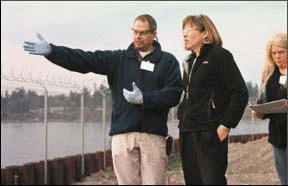On the home front, the environment still matters.
Touring the Wyckoff Superfund site Saturday afternoon, U.S. Sen. Maria Cantwell pledged support for completion of cleanup projects around the Northwest, even as the nation’s attention is focused abroad.
“What people need to remember is that while we’re fighting a war against the Taliban, there are domestic issues that shouldn’t be forgotten,” Cantwell said.
The visit by Cantwell, who represented the island as 1st District congresswoman from 1993-94, was her first to Bainbridge since her election to the U.S. Senate last year.
Cantwell also toured the new Puget Sound Environmental Learning Center; Saturday evening, she held a reception and fund-raiser at the Wing Point home of U.S. Rep. Jay Inslee.
Her trip to the Wyckoff site completed a trifecta for local officials hoping to see at least some of the 55-acre Bill Point parcel turned into a park. In August, U.S. Sen. Patty Murray toured the site with Inslee, on the heels of a visit by National Park Service officials.
Mayor Dwight Sutton used the opportunity to pitch public acquisition of the site, and development of a park and memorial to the Japanese-American internment of World War II.
Park district commission Dave Shorett cited the 4,000 feet of beach, some of it already restored, as “unique in Puget Sound.”
Cantwell was favorably disposed to public use; looking north and east from the steel bulkhead that now rings the property, she described the view as “incredible.”
“It’s not a hard sell from the perspective of the potential for the property,” she said.
Unlike earlier meetings, though, the talk Saturday focused less on the park and more on the cleanup itself. Cantwell and staff members cited the need for reauthorization of the federal Superfund program under which the Wyckoff property – a former industrial site fouled by decades of creosote work – is being reclaimed.
The Environmental Protection Agency has been at work on the site for a decade, and so far has spent $20 million or more.
Some of the cleanup construction costs have been recovered through disbursements by an environmental trust, created when the Wyckoff/Pacific Sound Resources company folded and liquidated its assets.
Other beneficiaries of the trust include federal natural resource agencies and two local tribes.
But even with the trust dollars, the cleanup’s future is clouded by an increasingly bleak federal funding picture.
Superfunding
Created by Congress in 1980, the Superfund has been supported largely by a tax on the petroleum and chemical industries.
But that tax expired in 1995, and Congress has had to supplement the fund with general tax dollars since that time.
Mike Gearheard, director of the EPA’s Region 10 Environmental Cleanup Office, said some recent projects have gotten as far as the design stage, only to be shelved for want of money.
“It is becoming increasingly difficult for Superfund sites around the country to find the funding they need,” Gearheard said.
“It’s safe to say that we’re concerned about the fiscal health of Superfund.”
If the petroleum tax isn’t reauthorized, the Superfund will eventually have to be supported entirely by federal tax dollars to survive.
“The money is likely to run out,” Cantwell agreed, “and we’re trying to figure out what to do.”
Future funding could prove key at Wyckoff, where construction is under way on a small steam plant for what is believed to be the final phase of work.
Beginning late next summer, high-pressure steam will be injected into what officials describe as the “oil reserve” under the small peninsula.
Engineers believe the steam will loosen up the remaining creosote deposits beneath the soil; contaminants will then be pumped to the surface, separated out and disposed of off-site.
If the pilot is successful, the project will be expanded and will continue over the next seven to 10 years.
The work could cost another $40 million or more, but most agreed Saturday that the environmental trust has no hope of recovering all of that money through its eventual sale of the property.
Cantwell’s Senate committee assignments – judiciary, and energy and natural resources – could be key in ensuring that the terms of existing cleanups are enforced, and that federal funding continues.
“The alternative, not having this type of program, is untenable,” she said.



